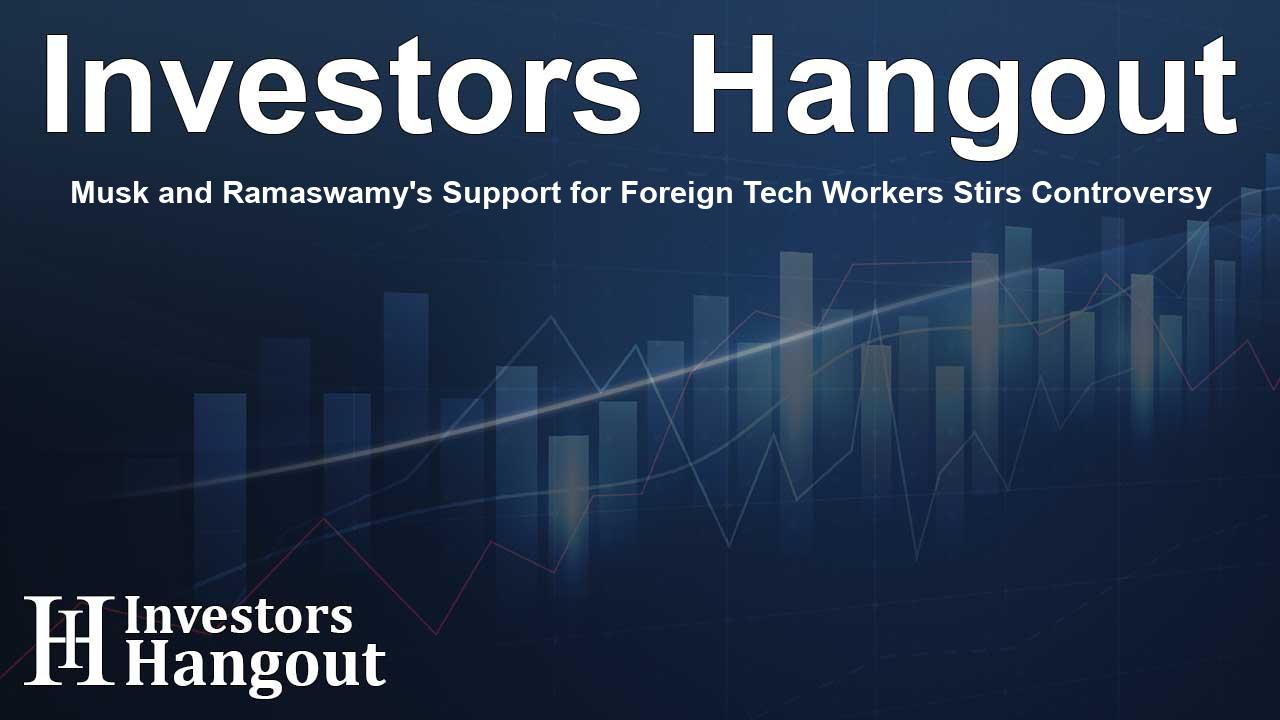Musk and Ramaswamy's Support for Foreign Tech Workers Stirs Controversy

Tech Giants Back Foreign Talent: A New Approach in Immigration Policy
In a surprising turn of events, billionaires Elon Musk and Vivek Ramaswamy are advocating for the inclusion of foreign tech workers in the U.S. labor market. Their recent statements have sparked lively discussions and debates among supporters and detractors alike, particularly within the MAGA community that has traditionally favored stricter immigration policies.
Understanding the Importance of Foreign Engineers
The tech industry has heavily relied on the H-1B visa program, facilitating the hiring of skilled foreign professionals. This program has allowed companies to bring in thousands of engineers and specialists, predominantly from nations like India and China. However, during Trump’s presidency, the H-1B visa program faced significant limitations due to concerns about its impact on American employment.
Musk, himself a former H-1B visa recipient and CEO of Tesla (NASDAQ: TSLA), pointed out that Silicon Valley is experiencing a severe shortage of exceptional engineering talent. In a statement he shared on social media, Musk emphasized that this shortage is a critical bottleneck for innovation and advancement in the tech sphere.
Ramaswamy's Perspective: Embracing Global Competition
Ramaswamy, a notable figure in the political landscape and a strong proponent of embracing foreign talent, argues that the U.S. must adapt to a highly competitive global market for technical expertise. He contends that settling for mediocrity in education and workforce development is detrimental and leaves the nation vulnerable to competition from countries like China. Ramaswamy’s comments underscore a fundamental shift in the conversation surrounding American culture and skill acquisition.
The Reaction from the Far-Right
The advocacy for foreign talent by Musk and Ramaswamy has rattled some members of Trump’s base, particularly individuals like Laura Loomer. Loomer, known for her provocative opinions, has openly criticized the administration’s moves to include more skilled immigrants, calling them contrary to the America First mantra. She believes that tech leaders are prioritizing their self-interests over the core values of the MAGA movement.
In a social media exchange, Loomer and venture capitalist David Sacks clashed over the future direction of the MAGA movement and the implications of immigration policies on American workers. The conversation revealed a growing rift between global-minded tech leaders and the more insular views held by some extreme political factions.
Trump's Dilemma: Balancing Interests
Currents of discontent loom within Trump’s loyal supporter base, and the former president has yet to publicly address the emerging conflicts. Historically, Trump has taken a hard stance on immigration, often framing it as a way to protect American jobs. However, the increasing tension illustrates the challenges that Trump may encounter in reconciling the demands of both his nationalist supporters and influential Silicon Valley leaders.
As discussions continue, the complexities of immigration policy and workforce needs remain at the forefront of public debate. Economists suggest that these discussions are merely the beginning of what may culminate in significant changes to U.S. immigration strategies, particularly in technology-related sectors.
Final Thoughts on the Immigration Debate
This unfolding narrative involving Musk and Ramaswamy is a clear indication of a shifting landscape in American immigration policy and workforce integration. The clash of ideologies presents both challenges and opportunities as stakeholders assess the best path forward for both American workers and the technology sector’s growth needs. Understanding and addressing these tensions will be crucial in shaping future policies that reflect the reality of a globalized labor market.
Frequently Asked Questions
Who are the main figures discussed in the article?
The article focuses on Elon Musk and Vivek Ramaswamy, who are advocating for support of foreign tech workers.
What is the H-1B visa program?
The H-1B visa program allows U.S. companies to hire foreign professionals, primarily focusing on skilled workers in technology and engineering fields.
Why is there controversy surrounding foreign workers in tech?
The controversy arises from differing views on immigration policy and its impact on American job opportunities, particularly among nationalist supporters of Donald Trump.
What are the potential implications of Musk's and Ramaswamy's stance?
Their statements could lead to significant shifts in immigration policy, potentially easing restrictions and allowing for a more diverse workforce in the U.S. tech industry.
How does this debate impact Trump’s political base?
The disagreement may create divisions within Trump's base, balancing the interests of hardline nationalists against those advocating for global competitiveness and technological advancement.
About Investors Hangout
Investors Hangout is a leading online stock forum for financial discussion and learning, offering a wide range of free tools and resources. It draws in traders of all levels, who exchange market knowledge, investigate trading tactics, and keep an eye on industry developments in real time. Featuring financial articles, stock message boards, quotes, charts, company profiles, and live news updates. Through cooperative learning and a wealth of informational resources, it helps users from novices creating their first portfolios to experts honing their techniques. Join Investors Hangout today: https://investorshangout.com/
Disclaimer: The content of this article is solely for general informational purposes only; it does not represent legal, financial, or investment advice. Investors Hangout does not offer financial advice; the author is not a licensed financial advisor. Consult a qualified advisor before making any financial or investment decisions based on this article. The author's interpretation of publicly available data shapes the opinions presented here; as a result, they should not be taken as advice to purchase, sell, or hold any securities mentioned or any other investments. The author does not guarantee the accuracy, completeness, or timeliness of any material, providing it "as is." Information and market conditions may change; past performance is not indicative of future outcomes. If any of the material offered here is inaccurate, please contact us for corrections.